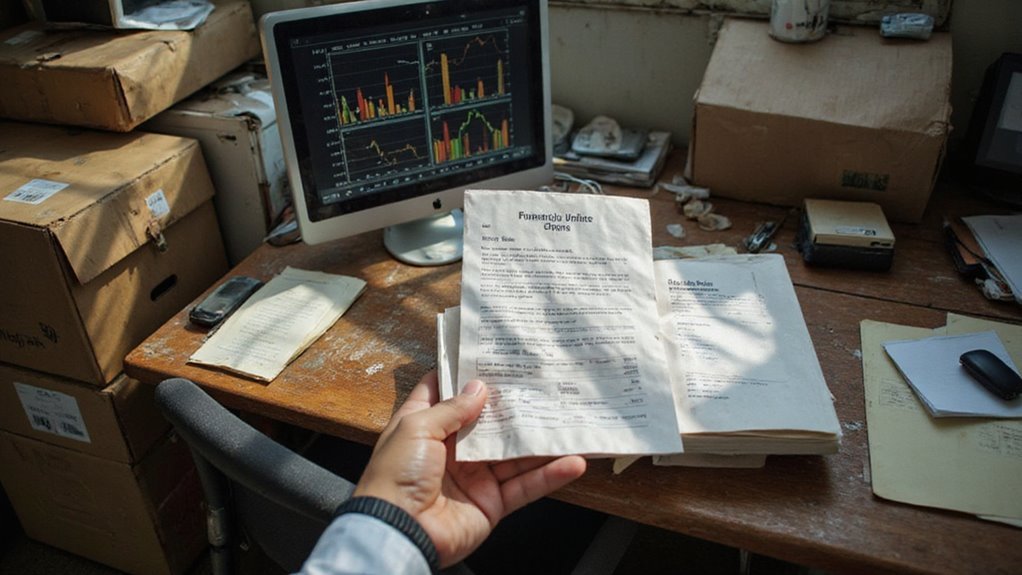Bad credit can really throw a wrench in your equipment financing plans, but don’t sweat it! Lenders look beyond your credit score, considering factors like cash flow and the value of the equipment. Sure, you might face higher interest rates and bigger down payments, but many lenders offer options for folks with credit challenges. If you play your cards right and present a solid financial illustration, you’ll enhance your chances. Stick around, and you’ll unveil even more tips to turn things around!
Key Takeaways
- Bad credit doesn’t disqualify you; lenders assess cash flow, revenue, and equipment value alongside credit scores for financing options.
- Expect higher interest rates (15% to over 25%) and larger down payments when applying with bad credit, increasing overall loan costs.
- Lenders focus on cash flow, net income, and collateral quality, making a strong financial image vital for approval despite bad credit.
- Online lenders and equipment leasing offer alternative financing routes with more lenient qualification requirements for those with lower credit scores.
- Improve your chances by presenting a solid business plan, maintaining good payment histories, and addressing any tax liens proactively.
Understanding Equipment Financing and Bad Credit

When you’re running a business, the last thing you want is becoming stuck in a never-ending loop concerning bad credit drama, especially when dealing with equipment financing. Envision this: you need a new item of equipment, but your credit score looks more like a horror story than a success tale. Don’t fret! While bad credit can make lenders raise their eyebrows, they also look beyond just that number. They consider your annual revenue, cash flow, and even the equipment’s value. Yes, you might face higher interest rates or bigger down payments, but many lenders cater to those with credit challenges related to financing equipment. So, with a little strategy and the right approach, you can secure the financing you need for keeping your business innovative and thriving.
The Role of Credit Checks in Approval Decisions
Even if you think your credit history is more like a scary movie than a tale of triumph, that doesn’t mean you’re automatically out from the financing game. Lenders often use credit checks to assess your creditworthiness, which can influence approval decisions. A good credit score improves your chances for a loan and can help keep those interest rates low. Depending upon the lending criteria, some lenders might even accept scores as low as 575, though they may bump up your rates or ask for extra collateral. If your credit’s a bit shaky, don’t fret! Instead, focus upon showing them your character—yes, they want to know if you’ve learned from past blunders. You’ve got that! Additionally, with options like equipment financing with no credit check, you can still secure funding without the burden of traditional credit assessments.
Impact of Bad Credit on Interest Rates and Terms
Having bad credit can feel like carrying a heavy backpack filled with rocks—you’re already struggling, and the extra weight doesn’t help! The impact of bad credit regarding interest rates is significant. If your credit score dips below 580, you could be facing interest rates soaring between 15% and 25% or more! This isn’t just a minor inconvenience; that also means higher monthly payments and costs over time. Additionally, stringent lender requirements often come into play, like higher down payments and shorter loan terms.
One potential option for those with poor credit is to consider financing solutions that may facilitate the acquisition of heavy equipment, despite credit challenges.
Here’s a quick look at the relationship between credit scores, interest rates, and loan terms:
| Credit Score | Interest Rate Range | Loan Terms |
|---|---|---|
| 700+ | 4% – 10% | Standard Terms |
| 600-699 | 8% – 18% | Moderate Terms |
| Below 600 | 15% – 25% or more | Shorter Terms, Higher Payments |
Key Criteria Lenders Assess Beyond Credit Score

Bad credit might feel like a storm cloud hanging over your head, but that doesn’t tell the whole story when you’re looking for equipment financing. Lenders dig further than just your credit score. They want to see your cash flow—like that lifeboat during a storm—ensuring you can handle loan payments without capsizing. They also check your financial health, evaluating your net income and debt obligations. Additionally, collateral quality matters. Imagine trying to secure a sailboat with a rubber duck—it just won’t cut it. You’ll need substantial, documented equipment to assure lenders. Industries such as restaurants and healthcare frequently utilize equipment loans, which can further demonstrate your understanding of financing needs. By being proactive and presenting a strong overall image, you might just sail smoothly through the financing process, even with bad credit!
Typical Terms for Bad Credit Equipment Financing
When you’re exploring equipment financing options but your credit isn’t shining like a star, don’t worry; there are still paths to take. Here’s what you can expect with typical terms:
- Down Payment: You might need a down payment of around 20% or more to ease lender jitters.
- Interest Rate Determination: Expect higher interest rates than most—think 3.5% upward, depending upon your credit situation. Ouch!
- Loan Terms and Repayment Length: Typically, repayment spans 1 to 6 years, with quicker schedules since lenders want their money back sooner.
In addition to these terms, be prepared for potential additional collateral requirements that some lenders may impose to offset the risk associated with bad credit.
Arming yourself with this knowledge can help you steer through the tricky waters of bad credit financing while still equipping your business for innovation! Keep pushing forward—you’ve got this!
How Lenders Mitigate Risks for Bad Credit Applicants
Steering the waters regarding equipment financing with less-than-stellar credit can feel like trying to swim upstream, but don’t worry just yet! Lenders have savvy strategies to mitigate risks for applicants like you. Initially, they know that collateral secures a loan, so the equipment itself often serves as primary security, giving lenders peace of mind. They may implement high-risk lending practices, like blanket liens on your business assets, to further limit their exposure. Expect a thorough application review, where they’ll explore your financial history—not just credit scores! They also use advanced risk management tech, tracking your ability to pay and watch over your loan closely. So, while it may seem intimidating, you’re not alone maneuvering this financing expedition!
Available Options for Businesses With Bad Credit

If you think having less-than-perfect credit means you’re stuck twiddling your thumbs when regarding equipment financing, think again! There are plenty of options available for keeping your business booming. Consider these alternatives:
- Online lenders often accommodate credit scores as low as 575, offering bad credit financing options customized for you.
- Many programs provide equipment financing options without extensive financials, requiring just a few documents like a credit application and equipment quote.
- Look for lenders that offer flexible repayment terms, typically ranging from 12 to 60 months, to suit your budget.
Equipment Leasing as an Alternative Financing Solution
If you’ve got bad credit and feel like your equipment dreams are just that—dreams—don’t fret! Equipment leasing might just be the lifeboat you need because this often comes with lower qualification requirements and flexible payment structures. Additionally, with leasing, you can upgrade for the latest tech without the hassle regarding being stuck with outdated equipment—talk about a win-win!
Lower Qualification Requirements
When you’re running a business, securing the right equipment can feel like a massive obstacle course, especially if your credit’s taken a hit. Luckily, equipment leasing can help you maneuver those tricky barriers with lower qualification requirements! Here’s how:
- You’ll find less stringent credit score requirements, getting you approved quicker.
- Leasing focuses more on your business cash flow than just your credit history, making it easier for you to qualify.
- Many leases require minimal or no down payments, so you won’t drain your capital right away.
This means that even if your credit’s not shining like a new penny, you can still get the equipment you need without putting your business at risk. It’s an innovative solution to keep you progressing onward!
Flexible Payment Structures
Securing the right equipment for your business doesn’t have to feel like climbing a mountain, especially if your credit score isn’t exactly dazzling. With leasing, you can tap into flexible terms that align with your cash flow, proving you’re as stable as your favorite coffee locale on a Monday morning. Payment plans can be customized, letting you avoid those huge upfront costs that make you sweat. Seasonal or deferred payments? They’ve got you covered! Additionally, leasing requirements for commercial truck financing with bad credit are often more forgiving than traditional loans. You’ll not only preserve your working capital but also keep your budget in check. Let’s face it, who doesn’t want a smart way to snag new equipment without breaking the bank?
Equipment Upgrade Opportunities
Upgrading your equipment doesn’t have to feel like pulling teeth, especially if your credit score isn’t exactly shining. Equipment leasing is your secret weapon for accessing state-of-the-art tools without the hefty upfront cost!
Here are three persuasive reasons to examine leasing as an alternative financing solution:
- Lower Payments: Leasing often requires little to no down payment, easing your cash flow woes.
- Tech Refresh: You can upgrade equipment easily at lease-end, ensuring you’re never stuck with outdated tech.
- Credit Flexibility: With less focus on credit history, leasing supports business stability even if your credit isn’t perfect.
Strategies to Improve Financing Prospects
If you’re looking to enhance your chances of securing equipment financing, there are a few smart strategies to contemplate. Elevating your industry experience shows lenders you know the ropes, while tackling any tax liens can clear the way for better financing options. And hey, a little credit score TLC doesn’t hurt—think about it as a makeover for your financial health; less drama, more confidence!
Enhance Industry Experience
When you’re looking to improve your chances for securing equipment financing, industry experience plays a crucial role—sort of like knowing the secret handshake at a club! Lenders get a warm fuzzy feeling when they see that you’ve been around the block a few times. Here are three ways to elevate your industry game for better financing:
- Show Off Your Tenure: At least three years in the industry grabs lenders’ focus. It shows you know what you’re doing!
- Craft a Solid Business Plan: Explain how the equipment increases your revenue, proving you can build and maintain strong credit and financial history.
- Document, Document, Document: Provide updated financial records that reflect your business’s true health.
The more confident you appear, the easier it is for lenders to say “yes.”
Resolve Tax Liens
Securing equipment financing can feel like attempting to solve a Rubik’s Cube blindfolded, especially if tax liens are lurking in the background. Don’t worry, though—resolving tax liens is doable! Paying off the lien in full is the quickest route. It can lead to a lien release, giving lenders confidence while evaluating risk. If cash flow’s tight, consider IRS installment plans to keep your operations running smoothly. Another option is an Offer in Compromise, allowing you to settle for less than you owe. Additionally, alternative lenders are often more flexible with terms, which makes them a great resource during this process. Show lenders you’re taking steps to resolve tax liens, and you’ll improve your financing prospects substantially!
Improve Credit Score
Enhancing your credit score isn’t just about numbers; that is about opening doors for financing opportunities that can help your business flourish. Here are a few strategies to elevate your score and make lenders sit up and take notice:
- Pay Off Outstanding Debts: Tackle those high-interest debts initially! Reducing what you owe shows lenders you’ve got your financial act together.
- Make Timely Payments: Consistency is key. Set up automatic payments to dodge those late fees and build a solid payment history.
- Check and Dispute Credit Report Errors: Regularly review your credit reports. If you find errors, contest them! Correcting mistakes could instantly raise your score.
With these steps, you’ll not only enhance your credit but also increase your chances for better financing options. Your future self will thank you!
Steps to Manage and Enhance Your Business Credit
Building strong business credit is like nurturing a plant—it takes care, focus, and the right conditions for it to flourish. Start by establishing clear credit policies that align with your financial goals. Monitor your receivables regularly, using metrics like Days Sales Outstanding (DSO) to catch any issues early. What lenders look for includes a mix of risk assessment and solid payment histories, so stay proactive in evaluating your customers’ creditworthiness.
Don’t forget to streamline your billing processes to save time—after all, who wants to chase down payments? Ultimately, keep refining your credit strategy. Remember, even the best equipment financing companies for bad credit appreciate businesses that show they’re working hard to improve. Keep growing that credit plant!
Frequently Asked Questions
Can I Still Get Financing if My Business Has Just Started?
Yes, you can still secure financing for your new business. Investigate options like equipment loans or leases, and be prepared to provide financial documentation. Some lenders specialize in supporting startups, improving your chances for approval.
What Types of Equipment Qualify for Financing Despite Bad Credit?
You can qualify for financing for several types about equipment despite bad credit, including heavy-duty trucks, construction machinery, material handling tools, and specialized medical devices, allowing you for innovate without draining your cash reserves.
How Do Personal Guarantees Affect My Business and Credit Profile?
Personal guarantees increase your financial risk, tying business debts to your credit profile. If defaults occur, your personal credit suffers, limiting access to future financing and stifling innovative growth opportunities for your business.
Are There Specific Lenders Known for Working With Bad Credit Businesses?
Yes, several lenders concentrate upon assisting bad credit businesses, like National Business Capital and Crestmont Capital. They assess equipment value over credit history, enabling you to finance crucial tools and drive your innovation forward swiftly.
What Documentation Do I Need to Prepare for My Application?
You’re gearing up for conquering the financing world! Gather your business tax returns, licenses, financial statements, and the equipment’s details—think about it as your battle armor for the innovation arena. Ready for winning?






